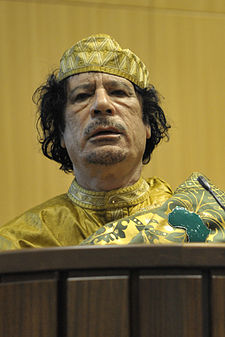

Saturday night the United Nations Security Council unanimously imposed sanctions on Libya and called for an international war crimes investigation of the regime behavior. This marks the end of a long period of international tolerance of Libyan excesses. In this post, mostly written before this change in the international posture, Daniel Dayan reflects on the international community and particularly France as enablers of a process that proceeded even as the regime was collapsing. Jeff
Muammar el-Qaddafi stands accused of crimes against humanity. Countless governments and nongovernmental organizations implicate him in the slaughter of his own citizens. His former Justice Minister holds him personally responsible for orchestrating the 1988 crash of Pan Am Flight 103 on Lockerbie. And thus I was amazed to see that the French media have not brought up Libya’s important and continual responsibilities as a member of the highest United Nations human rights body, the UN Human Rights Council.
The UN human rights watchdog has its own troubled history. Before the current Council replaced the Human Rights Commission (UNCHR) in 2006, Libya was one of the countries to stain the reputation of the Geneva based Commission. In January 2003, the UNCHR elected the Libyan ambassador Najat Al-Hajjaji its president. As the Associated Press reported, this happened “despite concern from some countries about the regime’s poor record on civil liberties and its alleged role in sponsoring terrorism. In a secret ballot, thirty three countries voted for the Libyan diplomat, just three opposed her and seventeen abstained.”

If this was not astonishing enough, the widely denounced behavior of the UN human rights watch dog did not improve over time. The newly reformed Council selected Libya to join the other forty six countries responsible for promoting and protecting human rights around the globe. In May 2010, through a secret ballot, Libya received one hundred and fifty five votes from the one hundred ninety two members of the UN General Assembly.
It was only this past Friday, one year into Libya’s tenure, that the Council acted in a surprising manner. Based on the violent crackdown of the ongoing protests, the Council recommended unanimously the suspension of Libya, a “bold” diplomatic initiative that needs approval by a two third majority of the General Assembly.
Meanwhile, the Qaddafi regime has been allowed to live in a different universe when it comes to human rights. Its arguments in favor of its seat on the UN body are worth reading:
‘The Libyan Arab Jamahiriya is fully committed to the promotion and protection of human rights. . . [T]he improvement of prisons’ conditions is part of a national advanced programme that ensures the training of judicial police officers in respect of human rights. . . The Libyan Arab Jamahiriya offers . . . the independence and neutrality of the judge. . . The existing law on prisons . . . is one of the most modern laws in the world. . . No individual is accepted into prison without a judicial decision. . . The Libyan Arab Jamahiriya pays great attention to women and children.’
Editorial note by Esther Kreider-Verhalle: This passage reminds me an awful lot of a statement by the Belarusian President Lukashenko. Many years ago, in May 1998, I was able to personally ask him about the issue of human rights in his country. He answered:
‘Everybody is talking about human rights. But I would like to know what kind of human rights are you referring to? It would easily take an hour to sum them up. There is the right to education. The right to live. And we are willing to discuss these kinds of rights with Western countries. We can deliberate and demonstrate that Belarus takes these rights very seriously.’
In 2007, The Human Rights Council rejected the membership of Belarus.
Leave a Reply